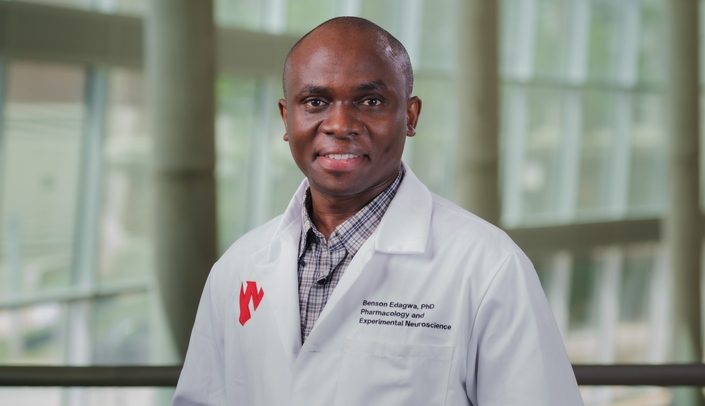Researchers at the University of Nebraska Medical Center (UNMC) have published data in a top scientific journal that may lead to a novel, long-acting treatment for both HIV and Hepatitis B (HBV). The article, "Transformation of tenofovir into stable ProTide nanocrystals with long-acting pharmacokinetic profiles," is published today in Nature Communications.
The interdisciplinary team was led by Benson Edagwa, PhD, associate professor and head of the Medicinal Chemistry Laboratory in the UNMC Department of Pharmacology and Experimental Neuroscience (PEN). The report, Transformation of tenofovir into stable ProTide nanocrystals with long-acting pharmacokinetic profiles, describes a novel long-acting drug formulation that may lead to HIV and HBV treatment and prevention.
The UNMC study demonstrates for the first time the chemical transformation of a daily antiviral medicine, called tenofovir (TFV), into a long-acting injectable that can be administered at or beyond two months. TFV is an antiviral that blocks viral growth inside human cell targets. By taking infrequent treatments, patients don’t need to worry about carrying around pills, skipping doses or the stigma of having to take these medicines.
UNMC got there by not only taking the road less traveled – but, one many thought was impassable. “We think this is going to be a major step forward and takes the subject of ultra long-acting antivirals in a new direction than previously thought,” Dr. Edagwa said.
Dr. Edagwa tested his ideas that there might be further possibilities beyond what had previously been established in scientific literature. UNMC was able to make several leaps by modifying TFV using a naturally-found lipid that is used to treat cold sores.
This not only made the drug more effective and stable, but also made it possible to easily manufacture the drug formulation. Due to its unique chemical makeup the compound is a prodrug – it becomes effective only when it reaches its virus target cells and tissues.
“The nanoparticles allow the drug formulation to be dissolved in bodily fluids,” said the study’s lead author Denise Cobb, PhD, a former graduate student at UNMC, who now works as a scientist at Bristol Myers Squibb. The nanoparticles slowly break apart to release the prodrug, which then is converted into its active form in bodily fluids containing required chemicals and enzymes.
Study collaborators included Howard Gendelman, MD, chair of the UNMC PEN department. Dr. Gendelman noted the impact of TFV’s potential for treatment and prevention of HIV and HBV infections.
“None of the only available monthly long-acting antiretrovirals for HIV are active against Hepatitis B,” Dr. Gendelman said. “Given TFV is a cornerstone for treatment of both viral infections, a long-lasting medicine in this class would be a game-changer.”
Drug testing was conducted in animal models. According to the study, no untoward side effects were seen. Human testing has not yet begun, but the development necessary to achieve this goal is well underway through Exavir Therapeutics Inc., a spinoff company from the laboratories of Drs. Edagwa and Gendelman.
Read the paper at https://www.nature.com/articles/s41467-021-25690-5.
Other researchers and their contributions to the study include:
Nathan Smith, PhD, postdoc, PEN
Suyash Deodhar, graduate student, PEN
Aditya Bade, PhD, instructor, PEN
Nagsen Gautam, PhD, research assistant professor, pharmaceutical sciences
Bhagya Laxmi Dyavar Shetty, MS, research technologist, PEN
JoEllyn McMillan, PhD, associate professor, PEN
Yazen Alnouti, PhD, professor, pharmaceutical sciences
Samuel M. Cohen, MD, PhD, professor of pathology and microbiology
The research is supported by the University of Nebraska Foundation, which includes donations from the Carol Swarts, M.D. Emerging Neuroscience Research Laboratory, the Margaret R. Larson Professorship, the Frances and Louie Blumkin Endowment, and the Harriet Singer Endowment; the Vice Chancellor’s Office of the University of Nebraska Medical Center for Core Facilities; Nickolus Badami Fellowship (to B.E.) and the National Institutes of Health grants 1R01AI145542-01A1, 1R56 AI138613-01A1, P01 DA028555, and P30 MH062261.
We are Nebraska Medicine and UNMC. Our mission is to lead the world in transforming lives to create a healthy future for all individuals and communities through premier educational programs, innovative research and extraordinary patient care.
Twitter | Facebook | Instagram | YouTube | Flickr
